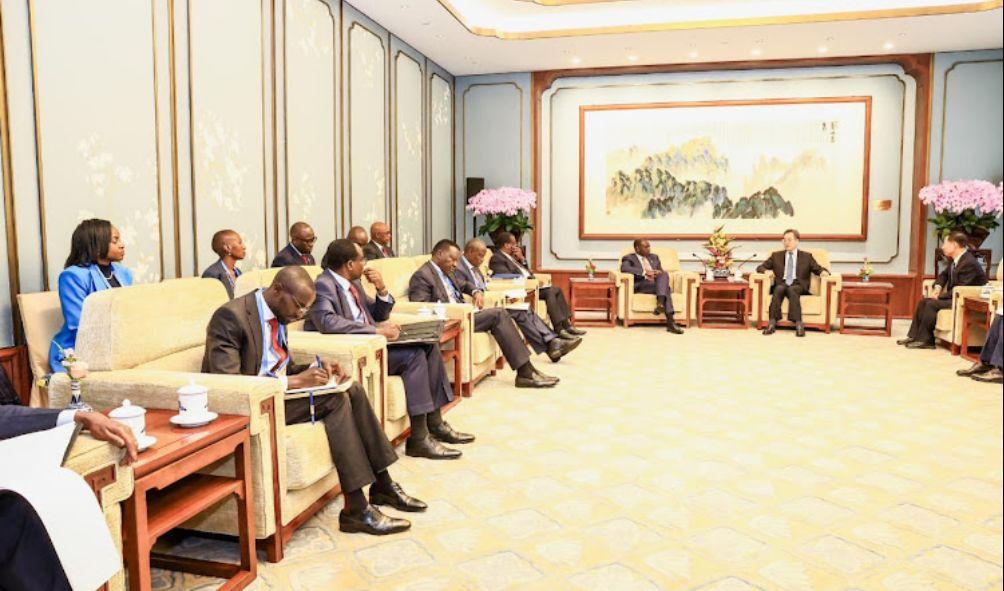Ruto’s China Trip: Unveiling the 4 Key CSs and Their Roles
President William Ruto, currently on an official visit to China, is joined by several Cabinet members, including Prime Cabinet Secretary Musalia Mudavadi.
The delegation also features Treasury’s John Mbadi, Davis Chirchir from Roads, Julius Ogamba from Education, and Eric Muriithi from Water, all playing vital roles in the trip.
Ruto is attending the Forum on China-Africa Cooperation (FOCAC) summit, which starts officially tomorrow.
The triennial summit, running from September 4 to 6, 2024, aims to enhance the partnership between China and Africa.
This meeting gathers representatives from 53 African nations and China to address key issues in the Africa-China relationship, such as trade, investment, and development.
Chinese President Xi Jinping is scheduled to inaugurate the summit on Thursday.
Beyond high-level talks to fortify bilateral relations with China, Ruto is expected to witness the signing of major infrastructure agreements.
China and Kenya have previously collaborated on prominent projects, including the Standard Gauge Railway, Kipevu Terminal in Mombasa, and the Nairobi Expressway, among others.
The participation of four Cabinet Secretaries is noteworthy due to the focus on critical development projects in partnership with Chinese companies.
Upcoming projects include extending the Standard Gauge Railway from Naivasha to Kisumu and Malaba, enhancing rural roads, and developing the Nairobi Intelligent Transport System (NITS).
Initially, the SGR was planned to connect Mombasa to Kisumu, but the project, started by former President Uhuru Kenyatta, was paused in Nakuru due to funding shortages.
ALSO READ:
- Inside Job Exposed: Kenyan Prison Wardens Convicted for Orchestrating Daring Terrorist Escape
- Uganda Pulls the Plug: Nationwide Internet Blackout Ordered Days Before Crucial General Election
- African Elections Under the Spotlight as Zambia Turns to Kenya Ahead of 2026 Vote
- “Two Drug Barons in Cabinet?” Kenya Government Fires Back as Ex-Deputy President Sparks Explosive Drug Claims
- Kenyan Court Freezes Use of Private Lawyers by Government, Sparks Nationwide Legal Storm
Kenya has secured an agreement for Uganda, Rwanda, South Sudan, and the DRC to complete the remaining sections of the SGR, extending from Mombasa to Kigali, Rwanda.
Former Roads Cabinet Secretary Kipchumba Murkomen announced that construction is set to begin in December.
Kenya will also advocate for more financial and technical assistance in crucial sectors.
The Cabinet approved the NITS in February to address frequent traffic congestion in Nairobi, aiming to replace the need for traffic police and county officers at various intersections.
Nairobi reportedly loses around Sh120 billion annually due to traffic jams.
The Bosto Dam water supply project in Bomet, which has been in planning for over a decade, is also on the agenda.
The government estimates that the project will need up to Sh15 billion and is a key initiative for addressing the country’s water shortages.
Ruto recently stated in Bomet that Sh15 billion has been secured from China for the Bosto water project, with plans to return in December for its launch.
Once completed, the dam will provide water to Konoin, Bomet Central, Chepalungu, Sotik, and parts of Buret in Kericho.
In education, Kenya aims to partner with China to upgrade equipment in technical and vocational training (TVET) facilities.
ALSO READ: Gachagua’s New Politics: A Game-Changer for His Rivals
Ruto’s delegation includes First Lady Mama Rachel, opposition leader Raila Odinga, Prime Cabinet Secretary Musalia Mudavadi, Treasury Principal Secretary Chris Kiptoo, and Korir Singo’ei from Foreign Affairs.
Ruto met with Chinese President Xi Jinping at the Great Hall of the People in Beijing, where Xi agreed to facilitate access for Kenya’s agricultural products to the Chinese market.
Ruto mentioned that they also discussed regional infrastructure projects, including the SGR expansion and the Rironi-Mau Summit-Malaba dual carriageway.
Kenya and China maintain strong, mutually beneficial diplomatic relations.
Ruto is set to co-chair a session on the Belt and Road Initiative and has also met Chinese Vice-Premier Ding Xuexiang at the Diaoyutai State Guest House in Beijing.
FOCAC, according to Ruto, emphasizes the Kenya-China strategic partnership and offers a platform to explore mutually beneficial opportunities for both nations.
China has constructed over 10,000 km of railways, 100,000 km of highways, 200,000 km of fiber optics, nearly 100 ports, 50 stadiums, 130 hospitals, and more than 200 schools across Africa.
Ruto’s China Trip: Unveiling the 4 Key CSs and Their Roles
